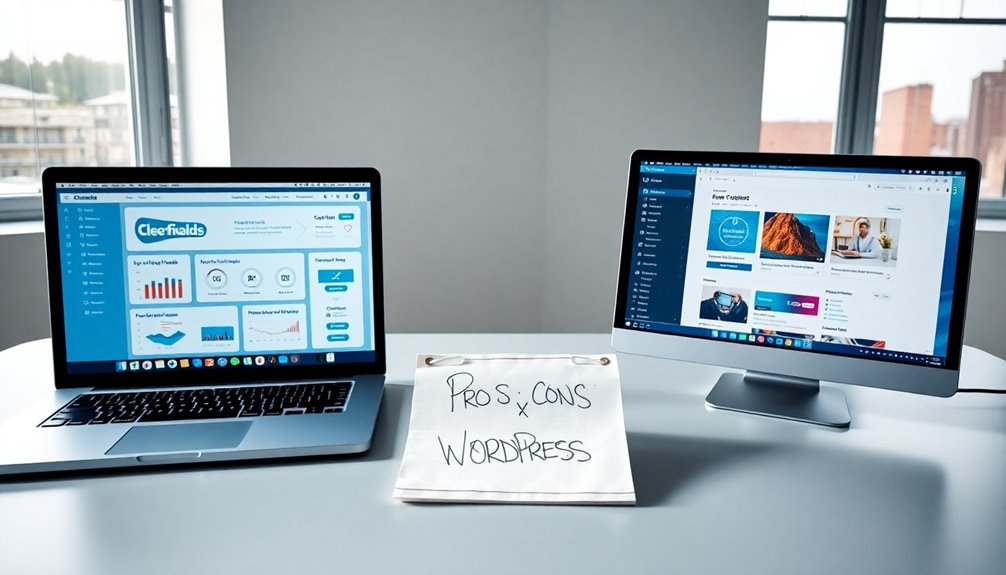When deciding between ClickFunnels and WordPress for your online business, consider your specific needs. ClickFunnels is perfect for quickly creating high-converting sales funnels with integrated marketing tools, making it ideal for focused sales strategies. On the other hand, WordPress offers immense customization options and is great for building versatile websites, but it may require more technical knowledge. If eCommerce is your focus, both platforms provide solid solutions, but WordPress, with WooCommerce, gives you more flexibility. Each has its merits, and you'll discover more about how they compare and which might suit you best as you explore further.
Overview of ClickFunnels
When it comes to online business, ClickFunnels stands out as an all-in-one marketing platform specifically crafted for building sales funnels that boost conversion rates. Launched in 2014, ClickFunnels has quickly evolved into a powerful tool featuring essential capabilities like email marketing, CRM, and analytics, all designed to streamline your sales process. Additionally, utilizing SEO optimization plugins can significantly enhance your online visibility and drive targeted traffic to your sales funnels. Moreover, incorporating secure backup solutions can help safeguard your data and ensure the integrity of your sales funnel information.
With its subscription-based pricing model, you can choose from plans ranging from $97 to $297 per month, depending on the features you need. This flexibility allows you to select a tier that best suits your business goals.
ClickFunnels 2.0, released in October 2022, introduced a new drag-and-drop page editor, making it easier than ever to create stunning sales funnels without any coding knowledge.
Additionally, ClickFunnels offers robust eCommerce capabilities, allowing you to manage both physical and digital products with a seamless checkout system. You can even build membership sites to provide exclusive content to your audience. Furthermore, plugins for e-commerce are essential for enhancing functionality, security, and user experience in online sales processes.
Overview of WordPress
WordPress embodies the spirit of adaptability in the domain of online content management, making it a top choice for website creators worldwide.
As the most popular content management system (CMS), it powers approximately 43.5% of all websites, thanks to its versatile platform and extensive customization options. Regular backups are essential for maintaining the integrity of your site and protecting against data loss. This practice is particularly important as it serves as a proactive defense mechanism against unexpected threats.
Here are four key features that make WordPress stand out:
- Wide Range of Website Types: Whether you're building a blogging platform, portfolio, or eCommerce store, WordPress has you covered.
- Plugins and Themes: With nearly 60,000 plugins and thousands of themes, you can tailor your site to fit your unique vision.
- Robust eCommerce Capabilities: Plugins like WooCommerce enable you to set up a fully functional online store with ease.
- Manageable Operational Costs: While WordPress.org itself is free, basic setup costs—like hosting and premium themes—typically stay under $250 annually. Additionally, many themes such as Astra provide user-friendly interfaces that cater to both beginners and experienced bloggers.
Key Features of ClickFunnels

ClickFunnels makes it easy for you to create effective sales funnels with its pre-built funnel templates, saving you time and effort. Additionally, focusing on high-quality content can further improve your conversion rates and establish authority in your niche. Furthermore, integrating social media buttons can significantly enhance your outreach and engagement, helping to drive more traffic to your sales funnels. You can also take advantage of integrated email marketing automation, which helps you nurture leads and boost conversions seamlessly. These features are designed to streamline your online business and enhance your marketing efforts. Moreover, using popular form builder plugins can further optimize your lead capture and conversion strategies.
Pre-built Funnel Templates
Pre-built funnel templates in ClickFunnels are a game-changer for online businesses looking to streamline their sales processes.
With over 100 customizable templates specifically designed for conversion optimization, you can quickly set up effective sales funnels tailored to your needs.
Here's what you can expect:
- Diverse Options: Choose from various templates, including sales, lead generation, and webinar funnels.
- Built-in Elements: Each template comes with essential features like opt-in forms, call-to-action buttons, and upsell pages, so you don't have to start from scratch.
- Time-Saving Design: Save time on design and development, allowing you to focus on your marketing strategy and business growth.
- Easy Customization: Use the drag-and-drop editor to customize your templates, matching their look and feel to your brand while keeping high conversion rates.
Email Marketing Automation
While managing an online business, having robust email marketing automation can greatly enhance your lead nurturing and conversion efforts. ClickFunnels provides built-in tools that allow you to create and manage email sequences directly within the platform, making it easy to nurture leads and drive conversions.
You can set up automated follow-up emails based on specific user actions, such as signing up for a list or making a purchase, ensuring timely communication.
With ClickFunnels, you also benefit from A/B testing functionality for your email campaigns. This means you can optimize your subject lines and content to improve your open and click-through rates.
The platform seamlessly integrates with popular email services like Mailchimp and ActiveCampaign, enhancing its automation capabilities. This allows for broader audience segmentation and targeted messaging.
Moreover, the email automation features work hand-in-hand with your sales funnels, streamlining the process of converting leads into paying customers through personalized engagement.
Key Features of WordPress
When it comes to building a robust online presence, WordPress stands out as a versatile content management system (CMS) that powers over 40% of all websites worldwide.
Its extensive flexibility makes it suitable for a variety of business models and projects. Here are some key features that set WordPress apart:
- Customizable Design: With thousands of free and premium themes available, you can easily tailor your website's look and feel to match your brand.
- Themes and Plugins: WordPress offers over 50,000 plugins to enhance functionality, whether you need SEO optimization, eCommerce integration, or social media connectivity. Additionally, you can utilize backup plugins to ensure your website's data is secure.
- SEO Optimization: The platform provides strong SEO capabilities right out of the box, enabling you to improve your search engine rankings without much technical know-how.
- Support for Online Stores: WordPress makes it simple to create online stores, allowing you to sell digital downloads, physical products, or services seamlessly.
- Proper database configuration can also significantly enhance site speed and performance, contributing to a better user experience and improved search engine rankings.
These features make WordPress an ideal choice for anyone looking to establish an effective online presence, from bloggers to eCommerce entrepreneurs.
Usability and Customization Comparison

In the world of online business, usability and customization play essential roles in determining the right platform for your needs. ClickFunnels offers a user-friendly drag-and-drop interface that simplifies the creation of sales funnels, making it accessible for beginners with minimal technical knowledge. You can quickly set up funnels focused on conversion optimization without getting bogged down by technicalities.
On the other hand, WordPress presents a steeper learning curve but provides extensive customization options. With thousands of themes and over 50,000 plugins, you can tailor your site to meet specific needs and preferences. This level of control allows for infinite design possibilities, perfect for those wanting a unique online presence. Additionally, leveraging performance optimization techniques can enhance your WordPress site's speed and reliability. Furthermore, employing security measures for WordPress sites helps protect your valuable content from potential threats.
However, keep in mind that ClickFunnels primarily provides pre-built templates, which can limit your customization opportunities. Additionally, WordPress users must manage their site's security and maintenance, handling regular updates and potential security plugins.
In contrast, ClickFunnels includes built-in security features and automatic updates, easing your workload. Ultimately, if you're after quick funnel setups, ClickFunnels is ideal, while WordPress is better suited for thorough control and extensive customization. Furthermore, choosing the right hosting provider can greatly impact your WordPress site's performance optimization, ensuring fast loading times and a reliable user experience.
Ecommerce Functionality Comparison
When comparing eCommerce functionality, ClickFunnels offers built-in features that simplify selling both physical and digital products through its funnel system.
In contrast, WordPress, especially with WooCommerce, provides extensive customization options and the ability to integrate various payment gateways. Additionally, themes like OceanWP enhance the online store experience with their lightweight design and WooCommerce compatibility.
You'll want to contemplate how these differences align with your business needs and goals.
Built-in Ecommerce Features
Ecommerce functionality is essential for anyone looking to sell online, and both ClickFunnels and WordPress offer unique features to support your business needs.
Here's a breakdown of their built-in eCommerce features:
- ClickFunnels provides a streamlined checkout process optimized for conversions, making it easy to manage physical and digital products directly within the platform.
- WordPress, when paired with the WooCommerce plugin, offers extensive product customization, allowing you to tailor your online store to fit your brand perfectly.
- The pricing structure for ClickFunnels starts at $97/month, which includes built-in eCommerce capabilities, while WordPress is free but may incur costs for hosting and premium themes.
- WordPress supports multiple payment gateways and thorough inventory management, making it ideal for larger online stores looking for advanced eCommerce capabilities.
Customization Options Available
Customization is a critical factor for online businesses, and it's where ClickFunnels and WordPress diverge markedly.
ClickFunnels offers built-in ecommerce functionality that's user-friendly and streamlined but comes with limited customization options. You can manage physical and digital products easily, and features like upsells and order bumps are designed to enhance conversion rates. However, you might find the scope of customization lacking if you want a unique branding experience.
On the other hand, WordPress shines with its extensive customization options. By integrating with WooCommerce, you gain access to a wide array of plugins and themes, allowing you to tailor your ecommerce site to fit your brand perfectly. You can customize everything from payment gateways to shipping options, making it easier to create a shopping experience that resonates with your customers.
While ClickFunnels operates on a subscription basis, WordPress is free to use, although premium plugins can add to your costs.
Ultimately, if you prioritize deep customization and a unique user experience, WordPress is likely a better match for your online business needs.
Integration With Payment Gateways
Selecting the right platform for payment gateway integration can greatly impact your online business's efficiency. When it comes to eCommerce functionality, here's how ClickFunnels and WordPress stack up:
1. Payment Gateways: ClickFunnels seamlessly integrates with Stripe, PayPal, and Authorize.Net, letting you manage transactions for both physical and digital products effortlessly.
WordPress, via WooCommerce, also supports numerous gateways like PayPal, Stripe, and Square, providing extensive flexibility.
2. Checkout Experience: ClickFunnels features a built-in checkout system optimized for conversion, while WordPress requires additional plugins to establish a complete eCommerce solution.
3. Sales Process: ClickFunnels streamlines the Sales Process with its integrated subscription management features, making recurring billing a breeze.
In contrast, WordPress typically depends on third-party plugins like WooCommerce Subscriptions for similar functionality.
4. Customization Options: While ClickFunnels offers some customization, WordPress shines with its extensive library of plugins, allowing for tailored payment settings.
Ultimately, your choice between ClickFunnels and WordPress will hinge on your specific eCommerce needs and how much flexibility you require with payment gateways.
Pricing and Cost Analysis

When evaluating the costs associated with ClickFunnels and WordPress for your online business, it's essential to weigh the ongoing expenses carefully.
ClickFunnels operates on a subscription model, with pricing ranging from $97 to $297 per month. These plans offer various features, including sales funnels and marketing automation tools. However, this can lead to higher ongoing monthly expenses compared to WordPress.
On the other hand, WordPress itself is free to use, but you'll need to budget for hosting costs, which typically range from $5 to $75 per month, along with domain registration at around $20 per year.
If you opt for premium themes or plugins, that's an additional expense to take into account. The total estimated annual cost for a basic WordPress setup can be less than $250, depending on your choices.
While ClickFunnels provides a 14-day free trial to explore its features, WordPress doesn't have a trial but is free to install.
If you're looking for eCommerce solutions, remember that WordPress may incur extra costs for tools like WooCommerce, whereas ClickFunnels includes built-in eCommerce capabilities, albeit with limited customization.
Security Considerations
Security is an essential factor to take into account for anyone running an online business, whether you're using ClickFunnels or WordPress. Each platform has different approaches to security that can impact your operations.
- Built-in Security: ClickFunnels offers built-in security features, including automatic updates and threat protection, so you don't have to manage security manually.
- User-Managed Security: In contrast, WordPress requires you to take responsibility for your site's security, including maintaining SSL certificates and regularly updating plugins.
- Vulnerability Risks: WordPress's open-source nature can expose you to vulnerability risks, especially if you use outdated themes or plugins.
- Backup Solutions: ClickFunnels automatically handles backups, whereas you'll need to implement your own backup solutions on WordPress to prevent data loss from security breaches or technical failures.
Making the Right Choice

In today's fast-paced digital landscape, choosing between ClickFunnels and WordPress can greatly impact your online business's success.
If you prioritize ease of use and quick setup for sales funnels, ClickFunnels might be the right choice for you. It offers built-in tools for email marketing and sales analytics that can streamline your marketing efforts.
However, if you need extensive customization and control over your website development, WordPress is your best bet.
Consider your eCommerce needs; WordPress with WooCommerce provides robust features and flexibility, whereas ClickFunnels offers essential eCommerce options with limited personalization.
The pricing structure also plays a role in your decision. ClickFunnels operates on a subscription model, which can offer predictable costs but may add up over time. On the other hand, WordPress is free, though you'll incur hosting fees and potential costs for premium features.
Ultimately, think about your long-term goals. If you're focused on straightforward sales processes and conversion optimization, ClickFunnels could serve you well.
But if scalability and adaptability are your priorities, WordPress might be the more strategic choice for your online business.
Conclusion
In choosing between ClickFunnels and WordPress, consider your unique needs. If you want streamlined sales funnels, go with ClickFunnels. If you prefer extensive customization and versatility, WordPress might be your best bet. Assess your goals, evaluate your budget, and think about your technical skills. Ultimately, whether you prioritize ease of use, flexibility, or scalability, both platforms can help you succeed. Make your choice based on what aligns best with your vision for your online business.



